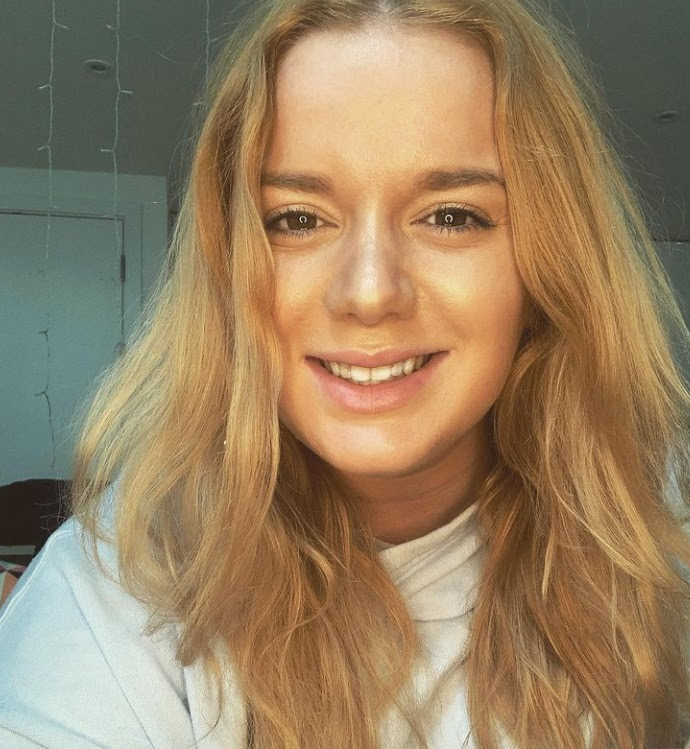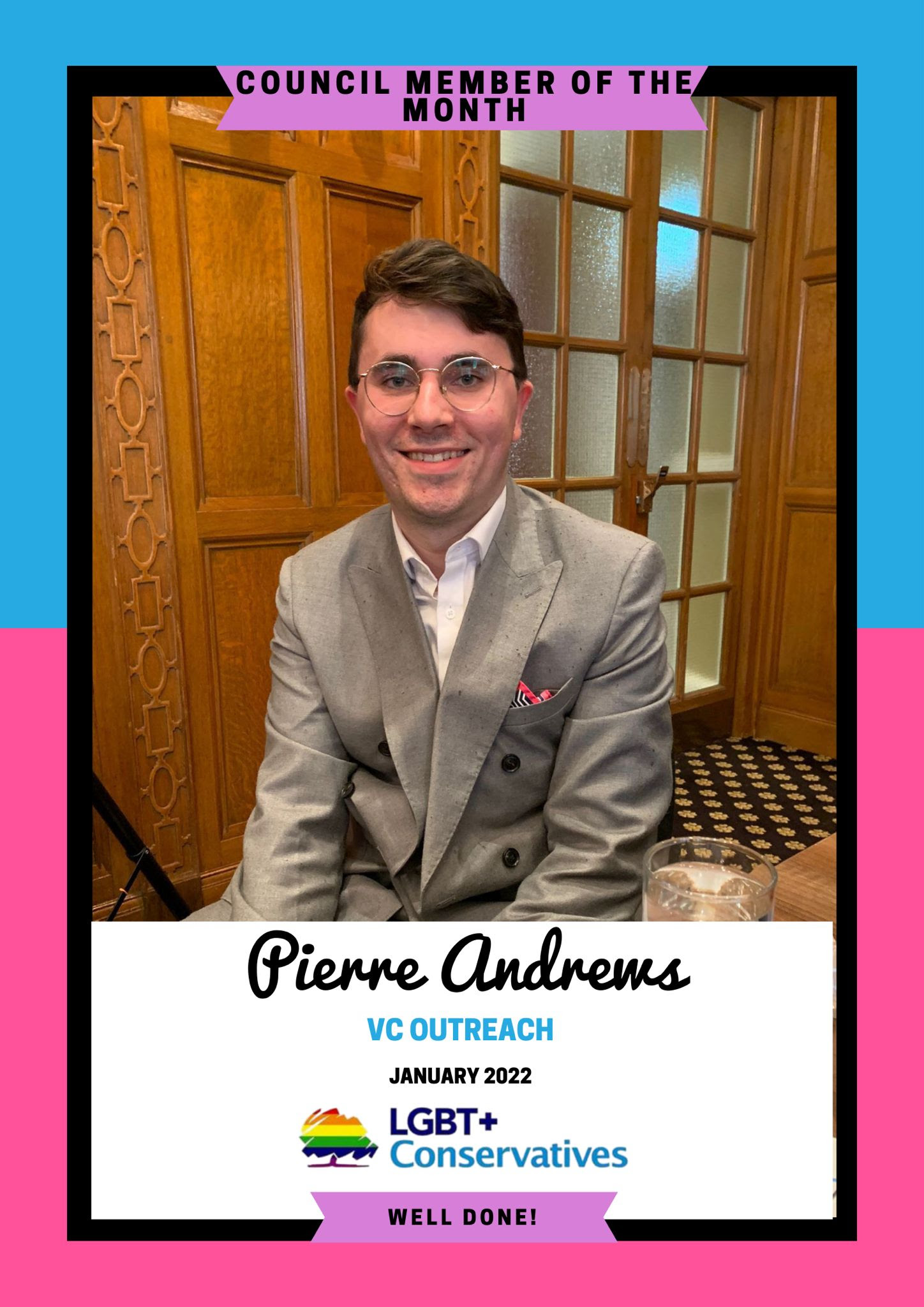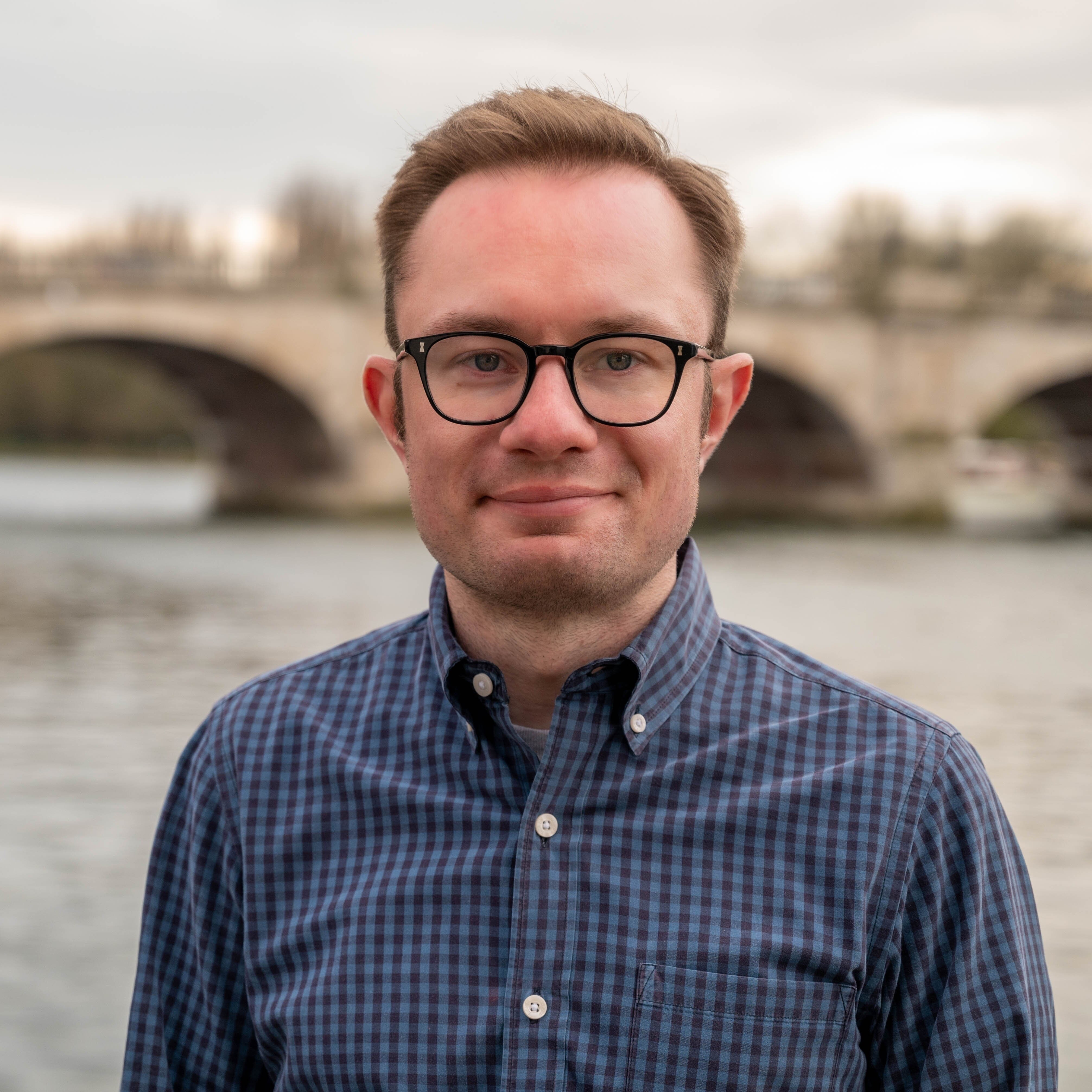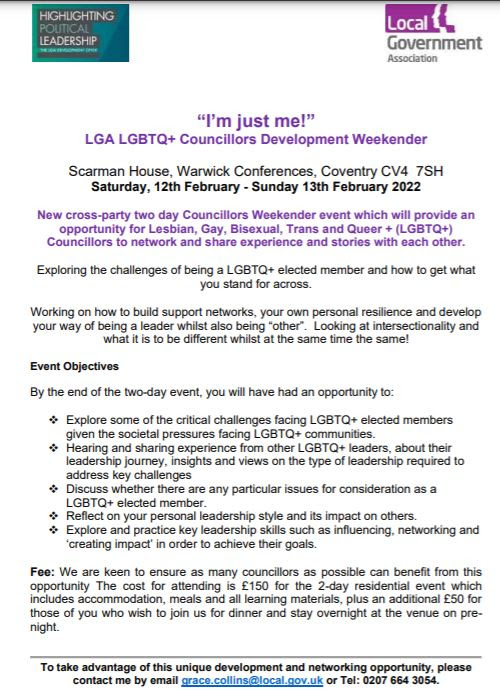
PRIDE AND POLITICS

Welcome to our latest newsletter!
Happy New Year!
Welcome back to our first newsletter of the year, and it is a packed one..
Keep your eyes peeled, as we're going to be sending more regular emails with some very special interviews.
Best,
Elena Bunbury, Chair and Editor
MEMBERS MOMENTS
MY HORROR WAS ROCKED
By Dr. Ross Hills

Dr. Ross Hills is Deputy Chair at LGBT+ Conservatives
Despite it being a bonafide worldwide phenomenon, I sat in the stalls of the Curve Theatre in Leicester recently with no prior knowledge of what was about to happen. If the fact that people were all dressed in revealing outfits wasn’t a hint, screams of slut and whore from the audience within minutes of the show starting certainly gave away I was in for a shocking night. Yes, I went to see the Rocky Horror Show for the first time.
In a nutshell, the show is about a newly engaged couple who seek refuge in an a castle inhabited by strange creatures hosting a Transylvanian convention. What follows is ‘creation’ of a muscle bodied Rocky, murder of groupies, infidelity (and a lot of it), alien invasion and even a German scientist thrown in for good measure, all intertwined with musical numbers.
When the movie version first launched in 1975, mere years after the Stonewall riots, it was a critical and commercial failure. Quite quickly however the film started to gain a cult following at midnight showings. Much of this success was down to support from the LGBT+ community who identified with its total embrace of sexual freedom, gender fluid characters and yes, really quite catchy song and dance numbers. For many, going to a local cinema to see a midnight showing was the only queer space they could indulge in as often the nearest gay bar was in the next city. This led to the musical reaching an iconic status within the community. Few depictions before had so embraced queer identity and gender non-conformity.
At the time of its launch, seeing Dr. Frank-N-Furter dressed in a corset, heels and garters licking his lips with a perfectly arched brow would have set the pulses of middle England racing. But 50 years later, does it still have the same shocking shine?
Well, clearly culture perspectives on the LGBT+ community have shifted massively over the last half century and whilst there is still work to be done, much of our communities experiences are better now than of previous generations. Queer culture is also much more visible - there’s a new edition of Drag Race starting every week it seems and LGBT+ movies such as Call Me By Your Name and Moonlight are achieving critical success. I'm not sure therefore that it still pulls the same cultural shifting punch that it once did.
Compared to other modern day offerings, Rocky Horror might not be everyone’s cup of tea and indeed it is likely not as subversive as when it was first produced. I can’t deny however, that I had a thrilling time seeing this production for what I’m sure won’t be the last time and yes, the songs have been stuck in my head ever since. I’d definitely recommending seeing the current UK tour which is running until the summer, even if just to appreciate its status in LGBT+ history.
GOING GLOBAL: WHAT WE CAN LEARN FROM OUR
SISTER-PARTIES
By Pierre Andrews

Pierre Andrews is Vice-Chair for Outreach at LGBT+ Conservatives
This month, LGBT+ Conservatives organised a panel with representatives from our sister-parties in the International Democratic Union. Not to discuss finer points of policy, or pressing international issues, but rather to share best practices on how to be effective LGBT+ centre-right campaigners in 2022.
With attendees from Finland, Sweden, Norway, Germany, the Netherlands, Belgium, Austria and the UK, it was a welcome opportunity to get to know each other, and exchange ideas and experiences on promoting LGBT+ rights in our parties’ programmes, but also showing to the wider electorate that the Left does not have the monopoly on pride, or on standing up for queer communities around the globe. Thank you in particular to Fredrik Saweståhl, Chair of the European Centre-Right LGBT+ Alliance, for helping organise the event.
Öppna Moderater, literally ‘Open Moderates’, started out as a network of members of the Swedish Moderate Party called ‘Gay Moderates’, before establishing itself as a union. Sophia Ahlin, Öppna Moderater’s International Secretary, gave us some top tips on how best to manage media relations. By reaching out to local media outlets every time you take part in a different town’s pride festival, and getting established politicians and local figures to put their names to articles and campaigns, you can increase your visibility and make sure your message actually reaches the wider electorate. At the same time, at an international level, Sophia told us that translating content from one language to another can help highlight the achievements of your organisation, giving good ideas to LGBT+ centre-right campaign groups across borders.
In Norway, Åpne Høyre (Open Right)’s Helge Ytterøy L'Orange told us that his organisation has also helped the Høyre party increase its visibility at pride festivals, stating the irrefutable fact that compassionate conservatives do stand up for LGBT+ rights. I asked Helge how Åpne Høyre was able to campaign on LGBT+ issues inside the party as well. He explained that at the party’s last landsmøte, the equivalent of our Conservative Party Conference, he brought to the floor a series of ‘Pink Points’, calling for the party to not have a specific siloed programme on LGBT+ rights, but to incorporate them in all aspects of government policy: from healthcare to education, as well as in foreign policy. One such example they’ve been successful in is the recognition of LGBT+ refugees as deserving of special recognition in immigration proceedings, like we in the UK called for in the wake of the atrocities in Afghanistan.
And in Germany, we heard about the work of the Lesben-und-Schwulen-Union. LSU are still seeking official recognition from the CDU party. For comparaison, in the UK, Gay Conservatives acheived this in 2003 - we send LSU every best wishes of success. Alexander Vogt told us that his group worked on this by giving local association members postcards, starting with ‘CDU needs LSU because…’ and asking members to fill in the rest. All of the postcards were then exhibited at party conference. Another campaigning tactic, we were told, can be credited to LGBT+ Conservatives’ very own Colm Howard-Lloyd, who encouraged LSU to design an Angela Merkel ‘Mutti’ emoji that every party member then wanted to get their hands on!
(-_-)
-<>-
I also asked Alexander how LSU has been able to campaign on behalf of the CDU in federal elections. He told us that LSU members have stood as CDU candidates, but that it is an uphill battle: posters get torn down, simply because of the fact they show LGBT+ individuals. As we in the UK know, recognition by a party of its LGBT+ group sends a strong message to wider politics that your voice is legitimate regardless of your sexuality or gender, and so we hope the CDU will do so soon.
Indeed, the UK had a lot to share at the event too. Campaigners from all these different countries were particularly interested to learn about how LGBT+ Conservatives have been fundraising for candidates, through dinners, receptions, and auctions at social events. Our Chair Elena Bunbury explained how we allocate our funding to the candidates we think have the best chances of winning, increasing LGBT+ Conservatives representation in the House of Commons, Scottish Parliament and Welsh Senedd, but also about how we provide mentoring to potential candidates from established politicians.
The event was undeniably a success - I look forward to working with all of these groups, and hopefully many more.
COUNCIL MEMBER OF THE MONTH

"Pierre has been working for months on increasing our International Outreach and this month put on an amazing event with attendance from across the globe. It was an opportunity to share tips and best practices, to help improve LGBT+ represent across right wing politics. He is an incredibly hard worker and I am very proud of him."
SPOTLIGHT SERIES

A NOSEY INTO NICK
An interview with Nick Rogers GLA
This month, our Council Member Tom Hulme got to sit down with our patron Nick Rogers GLA, to chat all things South London and politics.
Hi Nick! How was Christmas for you this year?
Hello! It was fab, thank you for asking. We were with my husband’s family in Kingston for Christmas Day. With nine nieces and nephews and 17 of us in total, it was rather manic but good fun.
You were elected to the London Assembly as the Member for South West in May. How did you find the campaign?
Long, gruelling at times but totally energising. South West London is a challenging constituency and victory was by no means a foregone conclusion. I am lucky to have so many amazing campaigners across the constituency and I drew on their collective energy for support and encouragement more often than I can remember. Winning was absolutely a joint achievement.
Tell us a bit about where you come from and what your childhood was like?
Like many Londoners, I was born outside the city – in Tunbridge Wells, Kent. A lot of my childhood, to be honest, was spent with my nose stuck in a history book, something that remains a passion of mine. It wasn’t always an easy upbringing; my parents divorced in my early teens after long years of tension and, of course, all that took place while I was dealing with my sexuality. Like so many before and since, I found colour, comfort, friendship and, indeed, a husband in the great melting pot of London.
Prior to your election you served in the Metropolitan Police as a Special Constable. How did your experiences in the police shape your passion for public service?
My grandfather served in the Ministry of Defence Police, so I grew up listening to his stories and was always interested in policing. I became a Met Police Special Constable while working at Transport for London back in 2007 and I learned so much about policing, about public service and about London.
The Met has an almost unthinkably challenging job; maintaining order in one of the most complex cities in the world, in a febrile political landscape, battling to stay one step ahead of a continually evolving criminal ecosystem. The passion and dedication I saw among the Met’s officers – especially among the local officers I served alongside – has been an inspiration ever since. For these officers, policing isn’t a job but a calling – they have a mission to make London a safer place. I’ve also seen this sense of vocation during my decade-long career in public transport and it is something I try to emulate in my own public service.
As well as your police work you’ve been an active member of your community in South West London, founding TEDxKingstonUponThames in 2016 and then going on to set up two Little Free Libraries. What drove you to invest your energies into projects like these?
I believe passionately that the problems we share in London can be solved, one conversation at a time. My community projects are designed to spark those conversations. TEDxKingstonUponThames gives a platform to people with inspirational ideas and stories and it’s been extremely satisfying to hear how their TEDx talks open up new opportunities for them and inspire others to drive change in their own communities.
The Little Free Libraries are an effort to spread the love of books and reading. The first went up on the council estate where I lived at the time. People told me it would be vandalised within days, but that didn’t happen. Instead, it became heavily used. I used to see a mother send her two kids out once a week to swap out their books; heart-melting!
You’ve recently been doing some work at City Hall campaigning for Sadiq Khan to take action on anti-LGBT+ hate crime in the city. What do you think are the causes for the spike in hate crimes and what do you think needs to happen to put an end to it?
My work here is focused on domestic abuse in London’s LGBT+ community; an underrepresented issue and one that often gets left out in discussions on domestic abuse. There is massive underreporting and gay men in particular often don’t recognise abusive behaviour. Many services that could be accessed by LGBT+ people are marketed in such a way that is – probably inadvertently – exclusionary. I am working on a report that will look at this issue and make recommendations on how it could be improved.
A recent Galop survey showed that 62% of LGBT+ people in the UK have experienced LGBT+ violence or abuse. Worryingly, that same survey showed that only 13% reported this to the police and, of those who did, only 46% were satisfied with the response. We must tackle this underreporting and also hold the police to account for how they deal with these issues. There are lots of levers we could reach for to put a stop to the rise in hate crime. I’ve spoken elsewhere about the ‘one conversation at a time’ approach, and restorative justice is one lever that I believe has a strong role to play in ending hate crime.
The GLA is famous for being quite spicy, how did you find the atmosphere when you joined? Have you learnt from other more seasoned members of the GLA and if so, what?
You’re right, it can be a bit fiery, but I am very lucky in having amazing colleagues in the GLA Conservatives group. They are a very supportive group of people who are great to work with; for example – and forgive the plug – Neil Garratt and I collaborate on a podcast called Inside City Hall, which is immense fun.
Each member has their own interests and many are absolute encyclopaedias, so there is always someone to ask when I have policy questions. We are fortunate, too, to have an amazing team of researchers and support staff, all under the redoubtable leadership of Susan Hall. I could not be happier!
Tell us about your favourite things about London? What are the hidden gems everyone needs to visit?
Of course, I’m going to plug South West London. My three boroughs are among the most interesting in the whole city. Hounslow has Chiswick High Road, one of the finest high streets in London as well as some incredible stately homes and some of the most beautiful stretches of the Thames. Richmond has not one but two Historic Royal Palaces and London’s two largest parks. New Malden in Kingston is home to one of the largest Korean populations outside the Korean region itself, meaning we are blessed with some absolutely incredible Korean restaurants and shops.
There is much, much more – South West London is a wonderful part of the city!
After a night out, what is your dream takeaway that satisfies all of your needs?
All I’ll say is that I offer my humblest apologies to my constituents who may have seen me in Surbiton McDonald’s at 3am on one too many occasions.
What is your favourite biscuit?
This question caused much debate Chez Rogers. My immediate response was the mighty Gold Bar, but Liam questioned whether this could really be considered a biscuit. Thinking about it, my answer would probably be Anzac Biscuits. An Australian friend sent me a recipe during lockdown and I made batch after batch. An appropriate choice as we’ve just celebrated Australia Day!
EXTERNAL EVENTS

The LGA would like to invite Cllrs from the LGBTQ+ community to a new LGTBQ+ Leadership Weekender event. The event will provide Cllrs a safe space to explore the challenges of being a LGBTQ+ elected member, as well as sessions on building support networks, personal resilience and developing personal leadership styles. It will also be a fantastic opportunity for Cllrs from across the country to network, and share experiences and stories with each other. The 2-day event will take place at Scarman House, Warwick Conferences on 12-13 February.
